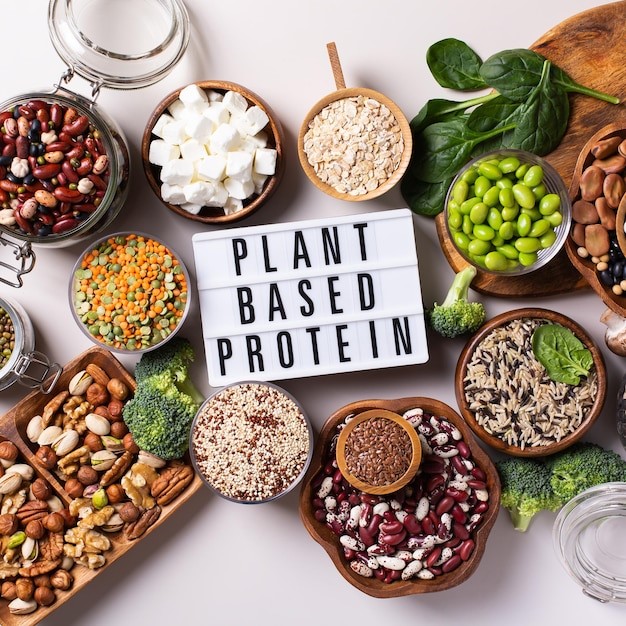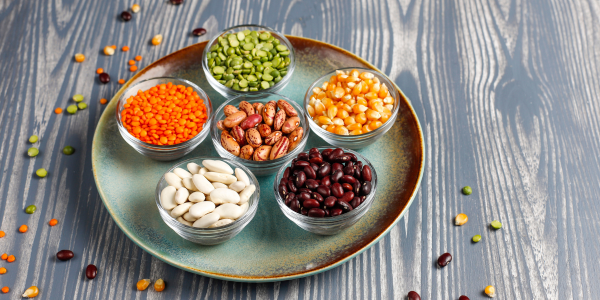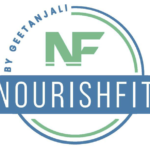Table of Contents
Toggle7 Essential Plant Proteins: Boost Your Health with These Power Foods
Understanding Plant-Based Proteins and Getting Enough
There is always a buzz about protein. Have you ever wondered if you’re getting enough protein from your vegetarian or plant-based diet? Or perhaps you’re curious about the best sources of plant proteins? You’re not alone! These questions often arise when considering plant-based eating. Let’s dive into the world of plant proteins, understand their benefits, and debunk some common myths along the way.

The Power of Proteins
“Let food be thy medicine and medicine be thy food.” – Hippocrates
Proteins are large, complex molecules in our body that have vital functions. They supply amino acids required for growth, repair, and maintenance of the cells in our body. Proteins also help with the supply of oxygen, muscle movement, enzyme production for metabolic reactions, and hormone production.
Complete vs. Incomplete Proteins
Foods containing all nine essential amino acids are called “complete proteins,” while foods lacking in one or more essential amino acids are “incomplete proteins.” Animal proteins from poultry, meat, and fish are complete proteins as they contain all the essential amino acids. In contrast, plant-based proteins are often incomplete, as they lack all the essential amino acids. However, by combining and eating a variety of plant foods, you can get adequate protein in your diet.
Benefits of Consuming Plant Proteins
With the growing interest in sustainable and healthy food alternatives, plant proteins have gained significant attention as viable substitutes for animal-based proteins.
Reduced Risk of Chronic Diseases
Research shows that replacing some animal proteins with plant proteins can reduce the risk of cardiovascular disease, obesity, and diabetes. Animal proteins tend to have higher levels of fat, calories, and sodium.
Nutrient-Rich
Plant proteins come with dietary fiber, vitamins, minerals, and phytochemicals, which help in managing metabolic syndrome, diabetes, cancer prevention, and weight management.
Gut Health
Plant proteins contain fiber, which benefits our gut microbiome. Dietary fiber found in fruits, vegetables, nuts, seeds, beans, and legumes serves as prebiotics for gut bacteria. These prebiotics produce beneficial compounds called short-chain fatty acids (SCFA) that improve gut health, reduce inflammation, balance blood sugar levels, and aid in nutrient absorption.
Cost-Effective
Beans, legumes, and pulses are inexpensive sources of protein compared to animal protein.
You don’t need to become a vegetarian or vegan to get the benefits of plant-based protein. Simply replacing some animal proteins with plant proteins can be beneficial.

Good Sources of Plant-Based Protein
Beans and Legumes
Beans and legumes are high in fiber and can be added to curries, gravy, pasta, patties, dips, salads, etc.
- 1 cup of cooked beans like green moong, kidney beans (rajma), or chickpeas gives you 7 grams of protein.
Lentils
Lentils can be easily added to soups, curries, tacos, or salads.
- 1 cup of cooked yellow or red lentils gives you 6 grams of proteins.
Quinoa
Quinoa is a complete protein grain, making it a great addition to salads, bowls, and as a side dish to add variety.
Nuts and Seeds
Nuts and seeds are great snacking options and are good sources of healthy fats, protein, and fiber.
- 15 grams (2 tbsp) of almonds or walnuts gives you 2.5 grams of protein.
- 15 grams (2 tbsp) of pumpkin seeds contain 4.5 grams of protein.
Soy
Products like tofu and tempeh made from the curdling of soy milk are high in protein and rich in vitamins and fiber.
- 100 grams of tofu gives you 17 grams of protein.
- 1 cup of cooked soya chunks gives you 15 grams of protein.
Edamame
Young soybeans are usually served in the pods. You can eat them boiled, steamed, or dry roasted.
- One cup (155 g) of cooked edamame contains over 18 grams of protein and 8 grams of fiber.
Supplementing Plant-Based Proteins
There are many high-quality vegan plant-based protein options available that can help meet the daily protein requirements of vegetarians and those with dietary restrictions.
Benefits of Plant Protein Supplements
- Lactose Intolerance: Ideal for people who are lactose intolerant or have food sensitivities to dairy protein, especially casein, which can cause bloating, gas, and diarrhea.
- Autoimmune Conditions: Individuals with conditions such as Hashimoto’s thyroiditis, rheumatoid arthritis, and psoriasis, which are characterized by inflammation, can benefit from plant proteins derived from anti-inflammatory sources like pea or rice protein.
- Digestive Conditions: Those with digestive conditions like IBS, SIBO, Crohn’s disease, and ulcerative colitis may find plant protein supplements easier to digest and less likely to cause gastrointestinal discomfort.
- Hormone Imbalances: Hormone imbalances such as thyroid issues and PCOS are often sensitive to dairy, which can worsen their symptoms. Plant protein supplements can be a suitable alternative.
When choosing a plant-based protein powder, it’s important to consider a reliable source, free from any allergens, additives, or preservatives, and suits your individual dietary needs.
Busting Common Myths About Plant-Based Proteins
Myth: Lectins are Inflammatory and Cause Autoimmune Disease
Fact: Lectins are a type of protein found in some plants. It is often believed that lectins are inflammatory and trigger immune responses, causing autoimmune diseases. However, research shows that using cooking methods like soaking, sprouting, and cooking reduces lectin content. The foods they are found in, like beans, legumes, and cereals, have numerous nutritional benefits.
Myth: Beans and Legumes Cause Bloating and Gas
Beans and legumes are rich in protein for vegetarians, but they also contain oligosaccharides, a type of carbohydrate that can cause digestive issues. Proper preparation methods like soaking overnight and cooking them thoroughly can help reduce these compounds, lessening bloating and gas. Individuals with IBS or SIBO should introduce these foods slowly in smaller, tolerable portions under professional guidance.
Conclusion
Our bodies continuously remodel and repair our cells and tissues throughout the day, requiring a steady supply of all the amino acids. I hope this blog has cleared your doubts about how to include more plant-based proteins in your diet to improve your health and performance.
For specific dietary requirements, health conditions, or goals related to plant-based eating, you can consult with a certified Nutritionist. They can provide personalized recommendations to support and help you optimize your plant-based diet.
For more insights and detailed health guides, visit Nourish Fit.



